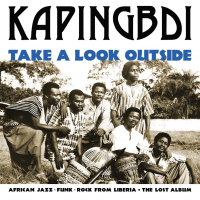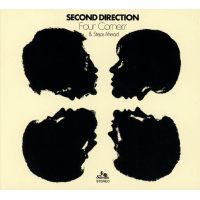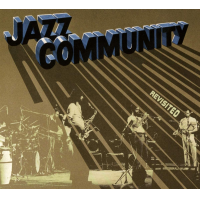Home » Jazz Articles » Multiple Reviews » The Funky Side of Sonorama
The Funky Side of Sonorama
Funk is about the joy of repetition, and rhythmic repetition, complex and simple, finds its way into all kinds of music from fusion and hard bop to soul jazz and afrobeat. Here are five funky servings from Ekkehart Fleischhammer's Sonorama label. Some of them are funkier than others, but they all share the quality of getting into a joyful state of rhythmic repetition while taking all kinds of musical detours.
 Jazz Rock Experience
Jazz Rock Experience Let Yourself Go
Sonorama
2018
If the album Let Yourself Go by the Swiss band, Jazz Rock Experience, sounds like the work of several bands, in a way, it is also the case. While members went in and out, saxophonist Bruno Spoerri, a familiar name for connoisseurs of Sonorama, was there from the beginning to the end. Spoerri has also penned the liner notes for the album, which is a compilation of tracks recorded between 1969 and 1970. At that time, jazz had gone through several transformations and somehow Jazz Rock Experience managed to pick up on most of them.
Whether it is making blues legend Lead Belly swing with dancing vibes and chugging guitar on "If It Wasn't for Dicky" or giving Herbie Hancock's "Blind Man" a silky soul jazz treatment, the band knows how to explore different genres, and, of course, James Brown's "Let Yourself Go" also gets a playful treatment.
The band is just as adventurous on their own compositions, with Spoerri providing "The Starter" and "Get Out Of Here," and trumpeter Hans Kennel, another key member, adding two other delights: "Cheyenne" and the elegantly executed "Blues No Blues" that channels blues, bop and free jazz into a distinctive expression. Kennel also proves his worth as an arranger on two traditionals: "Krivo Sadovsko Choro" and "Sometimes I Feel Like A Motherless Child."
If the jump from arrangements of folk music to Miles Davis in his Bitches Brew-phase sounds too impossible, just "Listen Here," as one of the tracks is called, and discover the wild world of Jazz Rock Experience.
 Kapingbdi
Kapingbdi Born In The Night
Sonorama
2019
Like Jazz Rock Experience, the Liberian band Kapingbdi also went through different incarnations, but saxophonist, percussionist and singer, E. Kojo Samuels, born in Lagos, Nigeria, remained as the leader all the time. In the sleeve notes, Ekkehart Fleischhammer explains how the name Kapingbdi means "born in the night" and refers to debate meetings in the city that could go on until late at night.
There is certainly a political vibe to the music of Kapingbdi. For instance, the opening track from the compilation Born In The Night, "Don't Escape," addresses capitalism directly as represented by a businessman: "where are you running to? You have done all these evil things in this world, man, man, yes, man, you wicked brother, you wicked man, you businessman."
Another political song is "Wrong Curfew Walk" with lyrics that according to the notes: "lament the killing of citizens during the curfew imposed by the Liberian government," but in a sense, all Kapingbdi's songs are political. They encourage action and independent thinking and combine complex shifting structures with catchy hooks and rhythms. There is a clear link to the African musical traditions of afrobeat and highlife. However, Kapingbdi had its own thing going with a funky and jazzy melting pot of music that is both traditional and urban.
 Kapingbdi
Kapingbdi Take A Look Outside
Sonorama
2019
The eclectic range of influences found in Kapingbdi's music can be revealed by listening to "The Prayer (23rd Psalm)" from the unearthed album Take A Look Outside. The song features a list that goes on and on, praising the God of Martin Luther King, Nelson Mandela, Bob Marley, Jimi Hendrix, Fela Kuti, John Coltrane, Cecil Taylor, Ornette Coleman, James Brown and many others. The track is a strange kind of meditative funky free jazz with spoken word, ghostly synths, spherical electric guitar and howling sax.
Recorded in 1985, Take A Look Outside is the fourth and final Kapingbdi album and according to E. Kojo Samuels also their best. Before the recording, the band had been touring America. The inspiration shown on "The Prayer (23rd Psalm)" highlight the connection to American culture and music, especially rock, funk and free jazz, but as it has often been pointed out, the link between the music of Africa and America is strong, so it's really not a contradiction that the album also promotes pan-African unity with the musicians' country of origin listed in the personnel. The music is heavily influenced by African traditions. This is pointed out in a press clipping from the Detroit Free Press inserted in the notes:
"Actually some Kapingbdi pieces are strictly African and played on acoustic instruments as traditional as a horn made from a hollowed elephant tusk. Most of the group`s music is a skillful mix of traditional and more contemporary African elements that should be hard to mistake with jazz, American pop and reggae. 'It`s All Africa, in some of the ways we phrase the dynamics. It`s still a kind of root'"
No matter what the music is, Kapingbdi communicates across geographical and generic boundaries and the two albums released by Sonorama form the perfect introduction to the band.
 Second Direction
Second Direction Four Corners & Steps Ahead
Sonorama
2018
The release of Take A Look Outside is a fine example of Sonorama's ability to find lost treasures and bring them to light. Sometimes the records have never been released before, other times they have been out of print, and there are also examples of records pressed in very small quantities, meant only for publishers and broadcasters, so-called library music.
One of the most sought out library records now sees the light of day and it's a funky thing. The album Four Corners & Steps Ahead by Second Direction combines the library music classic Four Corners with lost sessions from an aborted album tentatively titled Steps Ahead. It amounts to 77 minutes and 29 seconds of some of the finest funk jazz fusion committed to wax in Germany.
The man behind the project was saxophonist and flutist Fritz Münzer. Before he ventured into playing funky jazz fusion, he had already established his name as one of the leading jazz musicians in the country, playing west coast jazz and hard bop. His project with Second Direction was something else. It's smoother than Jazz Rock Experience and Kapingbdi, but still has enough bite. The band even gets away with a kitsch effect like the wind sound on "Storm Flute," a light groove with congas, synths, flutes and a sexy saxophone that would make Stanley Turrentine proud. Elsewhere, there's a surprising influence from Chopin on the spacy "Praeludium No. 3" and "Steamer" sounds like something from a car chasing scene in a blaxploitation movie. It all adds up to an enjoyable record that deserves its renowned reputation.
 Jazz Community
Jazz Community Revisited
Sonorama Records
2018
Finally, Hans Kennel from Jazz Rock Experience returns, but this time in an acoustic setting with Jazz Community, a prominent modal and post-bop band from Switzerland. The album Revisited compiles tracks from the albums Jazz Community and Il Topo recorded in 1979 and 1983.
While it would be wrong to call Revisited a funk record, it certainly contains funky elements and there's a clear link to the funkier side of hard bop represented by Lee Morgan and Horace Silver as well as the spiritual jazz of John Coltrane.
Once again, Kennel shows himself as a superb composer. Whether he's bringing in Latin elements on the catchy "Snobben" or stretching out on "Fjorden," a story in different chapters with a poetic prelude and swinging middle, Kennel challenges himself and doesn't stick to one mode of writing. He's the glue that binds the two different incarnations of the band together that can be heard on the album. The compilation includes studio cuts as well as live recordings.
Like any good funk player, Kennel finds joy in repetition, but he can also break out of predictable patterns. This record and the others in the batch might be funky, but they don't stick to the same groove. Instead, they highlight the richness and diversity of the musical language of funk, all with that special Sonorama stamp of quality.
Tracks and Personnel
Let Yourself GoTracks: If It Wasn`t For Dicky; Krivo Sadovsko Choro; Blues No Blues; Cheyenne; The Starter; Sometimes I Feel Like A Motherless Child; Let Yourself Go; Get Out Of Here; Listen Here; Blind Man.
Personnel: Bruno Spoerri: electric tenor saxophone, sopranino sax; Freddy Meier: tenor saxophone; Raffael Waeber: guitar; Dave Lee: electric piano, clavinet, vibes; Jonas Haefeli: flute, percussion; Hans Foletti: bass, electric bass; Kenny Schmidt: drums; Hans Kennel; trumpet; Nick Bertschinger: piano, electric piano; Christy Doran: guitar; Irène Schweizer: electric piano; Fredy Studer: drums.
Born In The Night
Tracks: Don`t Escape; You Go Go You Go Come; Wrong Curfew Walk; Our Heritage: Sengadebon; Take The Guitar OutSamuels; Boys Town; Deadea -Edit; Mali Feeling; Hey Brother; Kapingbdi.
Personnel: E. Kojo Samuels: saxophones, vocals, cane & metal flutes, horn (elephant tusk), kongoma, shekere, congas; Maisha El-Shabu: piano (fender rhodes), ballaphone, sassa, vocals; Joseph Kieh Blamo: lead & rhythm guitar, shekere, vocals; M. Ciaffa Barclay: congas, sangba drum, bamboo drums, percussion, vocals; G. Charles Fyneah II: bass guitar, slit drums, percussion vocals; Nana B. Johnson (Judas of Africa): drums, percussion, congas, vocals; Mamadee Kamera: bass guitar, bamboo drums, vocals; Jean-Claude Nanga: guitar, cow bells; Thomas Mensah: drums, sangba drums.
Take A Look Outside
Tracks: Africa-I-Deh; Take A Look Outside; Yakundé; Don`t Mess With The Music; Matumba; African Locomotion; Times So Hard; The Prayer (23rd Psalm); Mama Africa
Personnel: E. Kojo Samuels (Liberia): saxophone, lead vocals, flute, horn/ elephant tusk, drums, congas, shekere, ballaphone, kalimba; Joseph Kieh Blamo (Liberia): lead & rhythm guitar, shekere, vocals; Oliver Mensa (Ghana): bass, vocals; Nana Boachie -Yiadom (Ghana): drums, vocals; Richard "Papa Jah" Addison (Ghana): congas, sangba drum, vocals, lead vocals on "Yakundé" (Twi language); Samuel I. "Sam Kay" Kamara Foday (Sierra Leone): bamboo drums, kongoma, vocals, lead vocals on "Yakundé" (Mende language); Augustus "Daddy Boy" Fuller (Liberia/ guest): clavinet, piano, organ, synthesizer; Eric K. Paasewe (Liberia/ guest): kelen.
Four Corners & Steps Ahead
Tracks: Freeland; Storm Flute; Peace; Praeludium No. 3; Steamer; Flying Carpet Ride; Blue Dilemma; Four Corners; Steps Ahead; Feeling Free; Moving Fantasy; Keep Going; Tony's Choice; Last Minute.
Revisited
Tracks: Snobben; Keiler; Incarnation; Paris Minor; Welcome; Leaving the City; Segara Village; Fjorden; Scrap Iron; Afro Vision; Far Away; Desiderata.
Personnel: Hans Kennel: trumpet, flugelhorn; Paul Haag: trombone; Heiner Althaus: tenorsaxophone; Alex Bally: drums, percussion; Armin Keil: piano; Walter Schmocker: bass; Christian Beck: congas; Jürg Ammann: piano; David Elias: drums; Michel Poffet: bass.
< Previous
Joerg Steineck: Getting Inside Scofield
Next >
Battle Lines
Comments
Tags
Lead Belly
Herbie Hancock
James Brown
Hans Kennel
Miles Davis
bob marley
Jimi Hendrix
Fela Kuti
John Coltrane
Cecil Taylor
Ornette Coleman
Fritz Münzer
For the Love of Jazz
 All About Jazz has been a pillar of jazz since 1995, championing it as an art form and, more importantly, supporting the musicians who create it. Our enduring commitment has made "AAJ" one of the most culturally important websites of its kind, read by hundreds of thousands of fans, musicians and industry figures every month.
All About Jazz has been a pillar of jazz since 1995, championing it as an art form and, more importantly, supporting the musicians who create it. Our enduring commitment has made "AAJ" one of the most culturally important websites of its kind, read by hundreds of thousands of fans, musicians and industry figures every month.



















